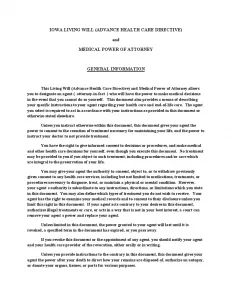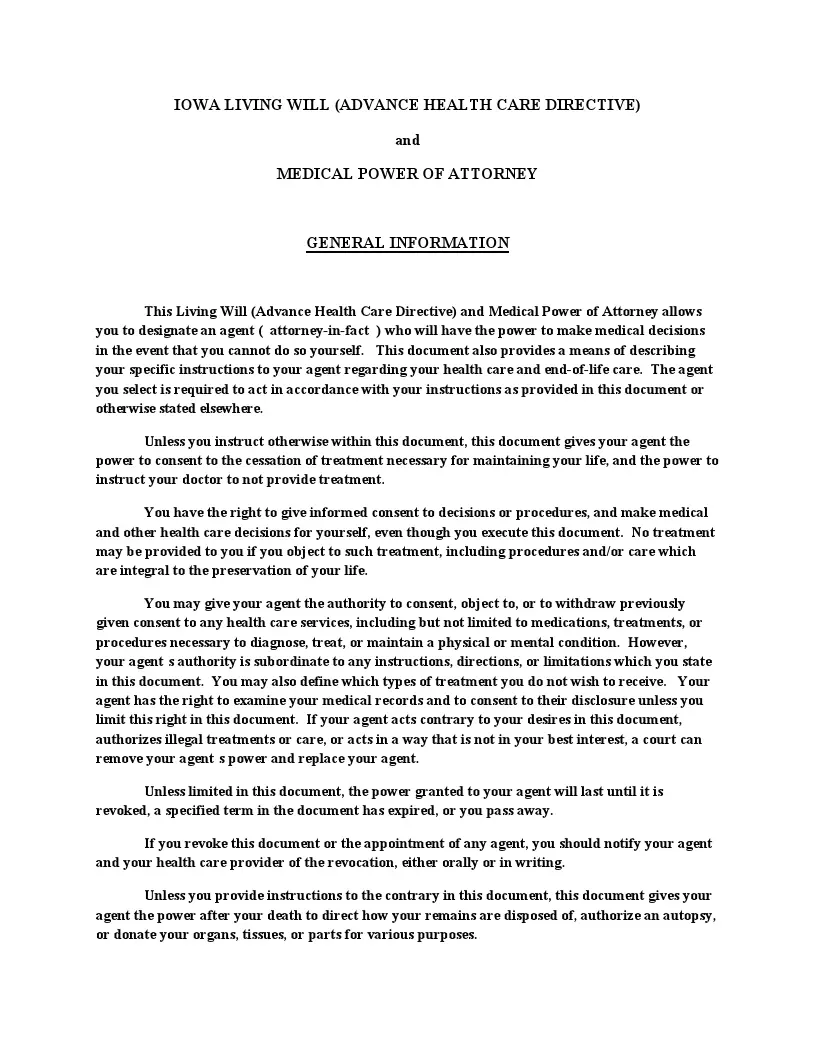Free Iowa Living Will Form
In Iowa, a living will is a legal document that allows a person to outline their wishes regarding medical treatment in situations where they can no longer communicate these decisions due to illness or incapacity. This document is crucial for guiding health care providers and family members in making decisions that align with the individual’s preferences.
A living will form includes instructions about using life-sustaining treatments, such as mechanical ventilation, artificial nutrition and hydration, and other medical interventions that prolong life. The declarant can specify under what conditions they want to refuse or accept such treatments. The Iowa living will becomes effective when the declarant is diagnosed as being in a terminal condition and unable to make decisions regarding their medical care.
Signing Requirements and Laws
Iowa’s legal framework for living wills is outlined in Iowa Code Chapter 144A, specifically the Declaration Relating to Use of Life-Sustaining Procedures. This document allows individuals to state their preferences regarding medical treatments if they are unable to communicate their wishes due to a terminal condition or state of unconsciousness.
The requirements specified in Iowa Code §144A.3 ensure the validity of a living will. The living will must be written, and the declarant’s wishes regarding life-sustaining procedures must be clearly stated. If the declarant is unable to sign the document, another individual may sign on their behalf at the declarant’s direction and in their presence. Two adults must witness the signing. Certain individuals are prohibited from acting as witnesses:
- The attending physician. This restriction is in place to avoid a potential conflict of interest.
- An employee of the attending physician. Employees might have an inherent bias due to their employment relationship.
- A health care provider with direct financial responsibility for the declarant’s medical care. Their financial interest could potentially influence their impartiality.
- Any individual who would have a claim against the estate of the declarant. The purpose is to prevent potential beneficiaries from unduly influencing the declarant’s decisions.
Also, notarizing the document provides an additional layer of authentication and helps prevent disputes about its validity. Under Iowa Code §144A.3, the living will becomes effective when:
- The declarant has been diagnosed with a terminal condition.
- The declarant is unable to make or communicate decisions regarding their medical care.
- The attending physician and another physician confirm the declarant’s terminal condition and inability to communicate.
Iowa Code §144A.4 allows the declarant to revoke the living will at any time, regardless of their mental state. This can be done through a written revocation, an oral statement to the attending physician, or any other act that clearly shows the intent to revoke.
Iowa Living Will Form Details
| Document Name | Iowa Living Will Form |
| State Form Name | Iowa Declaration Relating to Use of Life-Sustaining Procedures |
| Signing Requirements | Two Witnesses or Notary Public |
| Validity Requirements | Section 144A.3 |
| Powers Limitation | Section 144A.7 |
| State Laws: Iowa Code, Sections 144A.1 to 144A.12 | |

Steps to Fill Out the Form
Filling out the Iowa living will form involves several steps to ensure your medical treatment preferences are clearly documented and legally recognized. Follow these steps to complete the form accurately.
1. Read the General Declaration
Begin by carefully reading the general declaration section of the form. This part outlines the intent behind the document, explaining that it is used to declare your wishes not to have life-sustaining procedures if you are in a terminal condition or permanently unconscious.
2. Specify Your Health Care Agent
Identify and designate a trusted individual as your attorney-in-fact (agent) to make health care decisions if you are incapacitated. Fill in their full name, address, and phone number in the designated spaces on the form. This person will act according to your wishes and within Iowa law’s bounds.
3. Additional Provisions
If you have specific instructions or wishes that differ from the general declaration, enter these in the “Additional Provisions” section. This could include nuances to your decisions on life-sustaining treatments or other important details about your health care preferences.
4. Optional Organ Donation
Decide and indicate whether you consent to life-sustaining procedures for organ donation if you are deemed a suitable donor. This section is optional and should be marked accordingly to reflect your choice.
5. Sign and Date the Form
After completing the form, sign and date it in the presence of the required witnesses or a notary. This step legally binds the document and confirms your consent and understanding of its contents.
6. Witness or Notary Acknowledgment
Ensure the form is either notarized or signed by two eligible witnesses. The witnesses must be adults, not related to you, not entitled to any part of your estate, and not your health care providers. This ensures that the declaration is impartial and legally recognized.
7. Distribute Copies
After the form is fully executed, keep the original in a safe but accessible place. Distribute copies to your designated health care agent, physician, and close family members or friends who need to know your health care directives.

Below are various other Iowa templates completed by our users. Try our simple builder to customize these forms to your preferences.
